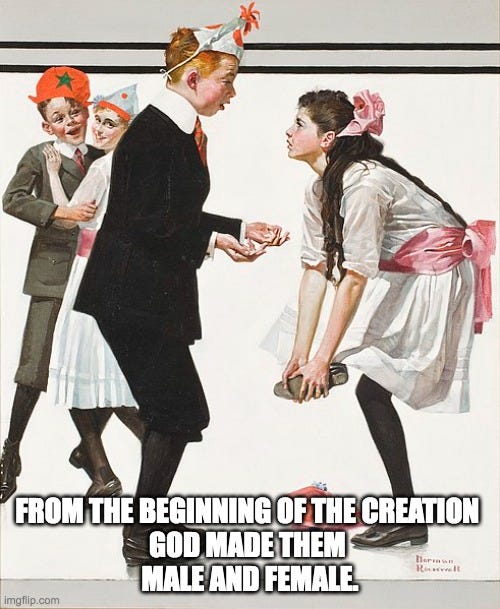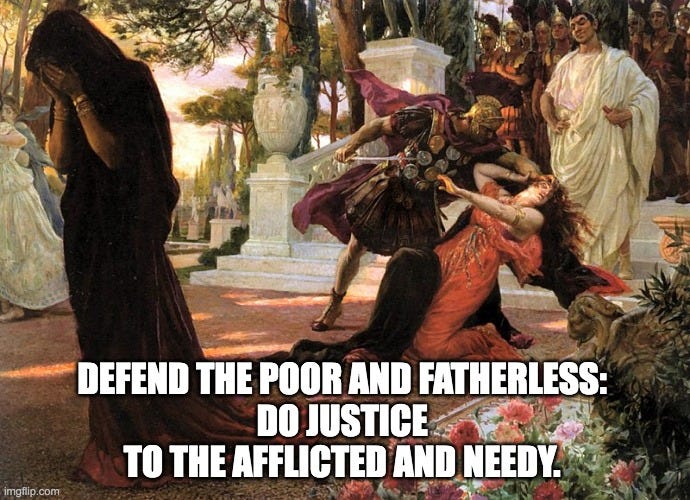The other day I had someone follow one of my works of fiction (Contract Marriage) and then, after a couple of hours, unsubscribe. She explained to me that she could not follow me due to my views on, among other things, ‘Women’s Rights’. Now, this amused me not a little because I don’t actually write about ‘Women’s rights’. Indeed, I avoid the term pretty assiduously.
Except that, after this little exchange, I thought I would. So here is a post on… women’s rights!
Positive vs Negative vs Forced
The first thing we need to discuss regarding the subject of ‘Women’s Rights’ is… positive or negative? Rights fall into two categories: negative rights, where the government can’t do something to you, can’t pass a law, can’t restrict you… and positive rights, where you claim the government owes you something.
And positive rights are separated into general and specific. A specific right is when something happens specifically to you that means that the government or someone else owes you specifically. Thus, if you get injured at work, you file a ‘claim’… you claim you are owed. You have a ‘right’ to compensation or such. Or you are accused of a crime, and you claim the ‘right’ to a speedy trial.
(I actually think that example is best viewed as a negative right. What is actually happening is that it is forbidden for the government to draw out your trial, to make it deliberately lengthy.)
A general positive right is when everyone, including you, is owed this thing. So people speak of a ‘right to healthcare’.
A ‘forced’ right is a bizarre concept. It is when the government doesn’t allow you to do something, because you have a ‘right’ not to do it. Sound bizarre? Consider the ‘minimum wage’. No one is forcing anyone to pay anyone to pay anything… they are saying that you are not allowed to take a job that would pay less than a certain amount. Even if you want to.
Think very carefully about this one, cause it is always addressed from the opposite perspective. What people actually say is that you have a ‘right’ to a given wage. But you don’t. I can name hundreds of companies that aren’t paying me anything, because they haven’t hired me. And if I went to them and said, “Can I work for you for $1 an hour, they would (most of them anyway) not say, “No, we will pay you $X an hour”… they would kick me out. They would pay me nothing.
Men vs Women
The second issue that needs to be addressed is, are we talking about women having (or not having) the same rights as men, or women having more rights or different rights than men? Are there distinctions or non-distinctions.
Take the infamous example of women’s sports. No one has a right to play women’s sports. But historically what has been said is that *only women* may play women’s sports. It was considered a right for women to not allow men to play on certain teams or in certain competitions.
So you might think of the ‘right’ to have a sex segregated bathroom… men to the right, women to the left. Or the ‘right’ to have a sex segregated team… women can play, men can’t. Or the right to be exempt from certain requirements… men can be drafted, women can’t. When I was young the girls in my high school had the ‘right’ to skip PE once a month. For a week or so.
Or the right can be a deliberate non-segregation. If male sportswriters can interview the team after the game in the locker room… then women sportswriters can to. (I will confess I don’t know if that non-segregation works both ways. Can a male sportswriter walk into the women’s changing room after the game and interview them?)
Right vs Wrong
Sometimes the word ‘right’ gets used as if it were referencing a negative right, when what was actually going on was that the speaker was speaking of a ‘wrong’. If you get robbed, it is silly to say that you have a ‘right’ not to get robbed. To the exent the society can, the society has already acted: it has made robbery illegal and (hopefully) it prosecutes robbers. But having a ‘right’ to something, or to be free from something, cannot stop lawbreakers from acting. Only force can do that.
Euphemisms
All too often the word ‘right’ gets used in a euphemistic way, or a way that is so general that it does not clearly communicate. To say that someone has a ‘right to healthcare’ is to speak very vaguely. To what extent and at what level should this be available? Is the society required to bankrupt itself to attempt to heal a given impossible sickness? Or does slapping a bandaid on enough?
If someone says that they have a ‘right to a divorce’ how many different aspects are there to that right? Does it include alimony? Child support? Does it require any sort of proof of wrongdoing?
What Women Want
GK Chesterton famously made the point that when women were agitating for the vote… it was a minority of women. That if it had been women who had voted on whether women should get the vote, they would have lost. Much of what goes on under the heading ‘women’s rights’ nowadays are things that a lot of women don’t want, and many more that actively harm women.
If you let a group of women compile a list of what they really want. Secret voting and all that. Indeed you might have to extract the list directly from their brains, they might not be able to even admit to themselves that they want certain things. Might it be… a husband? And children? Can you guarantee those rights?
Conclusion
Practically all of the discussion involving ‘women’s rights’ is useless for a discussion of practical policy. It blurs positive, negative, and forced rights; in confuses having a right to and being right to; and it is so euphemistic that no clear policy can be promulgated.
The poster was no doubt right that we disagree on ‘women’s rights’. I think women have a ‘right’ to a lot of things that would not doubt appal her, and I don’t think they have a ‘right’ to dozens of things that are no doubt bedrock understanding for her. And I think many of her ‘rights’ are actually active ‘wrongs’… active evils.
But it is hard to talk about it when it is so hard to talk about it.
Thank you for reading Von’s Substack. I would love it if you commented! I love hearing from readers, especially critical comments. I would love to start more letter exchanges, so if there’s a subject you’re interested in, get writing and tag me!
Being ‘restacked’ and mentioned in ‘notes’ is very important for lesser-known stacks so… feel free! I’m semi-retired and write as a ministry (and for fun) so you don’t need to feel guilty you aren’t paying for anything, but if you enjoy my writing (even if you dramatically disagree with it), then restack, please! Or mention me in one of your own posts.
If I don’t write you back it is almost certain that I didn’t see it, so please feel free to comment and link to your post. Or if you just think I would be interested in your post!
Thanks again, God Bless, Soli Deo gloria,
Von
Links
Patriarchy Discussion
and I are discussing patriarchy. I’m in favour and think it inevitable. J.S… not so much.
The Inevitability of Patriarchy: Laying some foundation.
The Blessings of the Breast and the Womb: The role of pregnancy, lactation, and raising children in the inevitability of patriarchy.
What is Marriage: Adding the issue of marriage, and discussing meritocracy and inheritance.
Not in the letter exchange, but on subject:
The Feminist Problem with Patriarchy: Some logical issues that feminists have when discussing patriarchy.
Not part of the discussion, but related:
Single Income Lots of Kids: The old lifestyle that contrasts with the modern perversions.
Does the Stereotypical Woman have a Vagina? Is it ‘prejudice’ to say women were designed to bear children?
Misogyny and Agency: Is it misogyny to say that women are human beings with agency?
Gender Roles: Should you be judged on how well your fulfil your gender roles?
The Modern Problem with Math: When it comes to kids, modern people can’t count.
INCHEL: Involuntarily Childless Women
Generational Wealth: The Foundation
Rights, Wrongs, and Affirming Gender
Depopulation Solutions: Can we solve our fertility crisis?
Problem with Patterns of Patriarchy
Fundamental Contradictions
Delphic Penumbra
Contract Marriage
Contract marriage is an adult dystopia examining the issues of marriage. Like 1984 and Brave New World, Contract Marriage treats the relations between the sexes as a fundamental aspect of how a society is formed and, thus, how a society can go wrong.
Unlike those dystopias, Contract Marriage isn’t all horrible all of the time. The characters for the most part have a good time and get along in their society. But the issues of sexuality, of marriage or not, monogamy or not, faithfulness or not, and gender roles… keep coming up and causing tension and conflict and joy and pain.
My desire is that my readers would be thinking along with my characters about these issues and perhaps even arrive at the same place (minus the flying cars).
Introduction
In which I lay out the themes that I intend to explore in this light Dystopia, and ask others to participate.
Trade Master: First Chapter
In which Fenestra, our heroine’s mother, puts in her application for the job of 'Trade Master’ on the planet Libertas, and finds out that it isn’t that easy.
En-Drek Contract
In which Fenestra finds out that, on Libertas, everyone must be in an ‘En-drek’ contract… a long-term, live-in, heavy date between a man and a woman for the purpose of producing one child after the other with one date after the other.
Disappointment and Meditation
In which Jellia, the daughter and our heroine, finds out about her mother’s job opportunity, including its difficulties, and commits herself to meditating on the situation. (And internally commits herself to encouraging her mother to take the job.)
Decision Reached
Jellia tells her mother that she thinks she should take the job, and so her mother puts in her application… and gets the job!
First School
Jellia goes to school and gets to tell everyone about her new adventure.
First Work
Fenestra goes to work, and tells her coworker about her new opportunity.
Writing Class
Jellia writes a poem (a limerick) and tells her classmates more about her new adventure.
Trader Galloway
In which a man comes over for a ‘date’ (Ie to sleep over with her mother) and to tell them all about his time as Trade Master for their company on Libertas. And as how he was almost executed for asking a woman out on a date.
Shopping
In which Jellia and her mother go shopping for the last time, and we explore some of the nature of the planet she is leaving.
Language
In which Jellia starts using some new words at school, and everyone gathers round to find out what they mean.
Kesh-i Cooking Class
In which Jellia finds out that children (Kesh-i) on Libertas are expected to cook.
Trade Master Training
In which Fenestra begins her training for her new role, with an old enemy.
Two Week Date
In which Fenestra and Alex decide to date for the next two weeks.
The Facts of Life
In which Fenestra brings Alex home, and Jellia isn’t impressed. Although she is interested in how dating works for boys.
Snips
In which Jellia spends time snipping with a boy, and brings him home.
Kissing
In which Jellia and her mother both have a sexual ‘last fling’ before they leave, and Jellia practices the new kisses she will need for her new planet.
Off Ephemera
In which Jellia and her mother arrive at the shuttle port, go through some annoying formalities, and take off!







